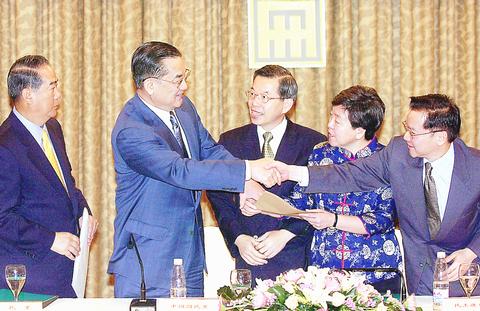Political leaders across party lines yesterday agreed to push for quick implementation of the proposals agreed to at last month's Economic Development Advisory Conference. They also want to promote further inter-party cooperation to help resolve Taiwan's economic problems.
The agreement was reached at a summit of party leaders and groups with deputies in the legislature. The summit was intended as the closing event for inter-party negotiations initiated by the KMT, the majority party in the legislature.
Those attending included KMT Chairman Lien Chan (

PHOTO: FANG PIN-CHAO, TAIPEI TIMES
"Today we've opened a door to inter-party cooperation. Under this atmosphere, we hope that we can further conduct issue-based cooperation to promote national prosperity and stability and the well-being of the people," Lien said.
Under the agreement, the political parties and groups will work to pass 34 pieces of priority legislation in the Legislative Yuan before the legislature is adjourned on Nov. 1 in preparation for the legislative elections.
The 34 items include 20 that are designed to implement the resolutions of the economic conference. The other 14 are aimed at preparing for Taiwan's expected accession to the WTO at the end of the year.
Also, the legislative caucuses of the various parties will set up a monitoring panel to ensure that the executive branch implements the economic conference's proposals in accordance with its targets.
In addition to the substantive measures to improve the economy, the political leaders concurred that other "non-economic factors" that are hampering economic development should be eliminated.
"The parties concerned will continue to push for inter-party amity and cooperation, abide by the constitutional system and build up steady relations between the executive and legislative branches to pursue a long-lasting peace for the country," the agreement stated.
With the prerequisite that Taiwan's national security is protected, the political leaders urged the government to negotiate with China as soon as possible on bilateral issues that are expected to arise after Taiwan's admission into the WTO.
"The authorities on both sides should resolve their differences and resume the cross-strait dialogue carried out by their respective agencies as soon as possible on the basis of the achievement of the 1992 meeting and a subsequent agreement reached in the Koo-Wang meeting of 1993," the agreement said.
The agreement, as soon as it was released, was presented to Premier Chang Chun-hsiung (
Chang promised that the Executive Yuan would implement the consensus of the Economic Development Advisory Conference comprehensively.
"Pursuing reconciliation between the ruling and opposition parties and the ideal of inter-party cooperation, the Executive Yuan will work hand in hand with the Legislative Yuan to work for the economy," Chang said.
While the Executive Yuan is accelerating the pace of legislative drafting so that bills can be sent to the legislature for review as soon as possible, the Council for Economic Planning and Development has been charged with the task of managing and evaluating the progress of implementation, Chang said.
Wang also said that the legislature would do its part, in line with the agreement reached at yesterday's political summit.

MAKING WAVES: China’s maritime militia could become a nontraditional threat in war, clogging up shipping lanes to prevent US or Japanese intervention, a report said About 1,900 Chinese ships flying flags of convenience and fishing vessels that participated in China’s military exercises around Taiwan last month and in January last year have been listed for monitoring, Coast Guard Administration (CGA) Deputy Director-General Hsieh Ching-chin (謝慶欽) said yesterday. Following amendments to the Commercial Port Act (商港法) and the Law of Ships (船舶法) last month, the CGA can designate possible berthing areas or deny ports of call for vessels suspected of loitering around areas where undersea cables can be accessed, Oceans Affairs Council Minister Kuan Bi-ling (管碧玲) said. The list of suspected ships, originally 300, had risen to about

DAREDEVIL: Honnold said it had always been a dream of his to climb Taipei 101, while a Netflix producer said the skyscraper was ‘a real icon of this country’ US climber Alex Honnold yesterday took on Taiwan’s tallest building, becoming the first person to scale Taipei 101 without a rope, harness or safety net. Hundreds of spectators gathered at the base of the 101-story skyscraper to watch Honnold, 40, embark on his daredevil feat, which was also broadcast live on Netflix. Dressed in a red T-shirt and yellow custom-made climbing shoes, Honnold swiftly moved up the southeast face of the glass and steel building. At one point, he stepped onto a platform midway up to wave down at fans and onlookers who were taking photos. People watching from inside

Japan’s strategic alliance with the US would collapse if Tokyo were to turn away from a conflict in Taiwan, Japanese Prime Minister Sanae Takaichi said yesterday, but distanced herself from previous comments that suggested a possible military response in such an event. Takaichi expressed her latest views on a nationally broadcast TV program late on Monday, where an opposition party leader criticized her for igniting tensions with China with the earlier remarks. Ties between Japan and China have sunk to the worst level in years after Takaichi said in November that a hypothetical Chinese attack on Taiwan could bring about a Japanese

The WHO ignored early COVID-19 warnings from Taiwan, US Deputy Secretary of Health and Human Services Jim O’Neill said on Friday, as part of justification for Washington withdrawing from the global health body. US Secretary of State Marco Rubio on Thursday said that the US was pulling out of the UN agency, as it failed to fulfill its responsibilities during the COVID-19 pandemic. The WHO “ignored early COVID warnings from Taiwan in 2019 by pretending Taiwan did not exist, O’Neill wrote on X on Friday, Taiwan time. “It ignored rigorous science and promoted lockdowns.” The US will “continue international coordination on infectious